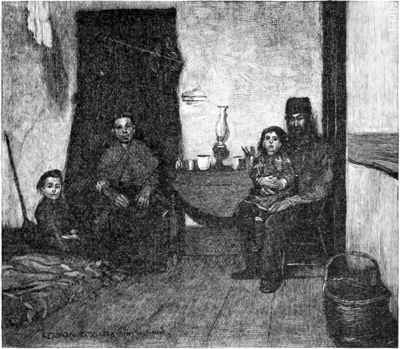THE COMMON HERD.
169
pled from lead poisoning. He had not been able to work for a year. A contagious disease of the eyes, too long neglected, had made the mother and one of the boys nearly

IN POVERTY GAP, WEST TWENTY-EIGHTH ST. AN ENGLISH COAL-HEAVER'S HOME.[1]
blind. The children cried with hunger. They had not broken their fast that day, and it was then near noon.
- ↑ Suspicions of murder, in the case of a woman who was found dead, covered with bruises, after a day's running fight with her husband, in which the beer jug had been the bone of contention, brought me to this house, a ramshackle tenement on the tail-end of a lot over near the North River docks. The family in the picture lived above the rooms where the dead woman lay on a bed of straw, overrun by rats, and had been uninterested witnesses of the affray that was an everyday occurrence in the house. A patched and shaky stairway led up to their one bare and miserable room, in comparison which which a whitewashed prison-cell seemed a real palace. A heap of old rags, in which the baby slept serenely, served as the common sleeping-bunk of father, mother, and children—two bright and pretty girls, singularly out of keeping in their clean, if coarse, dresses, with their surroundings. The father, a slow-going, honest English coal-heaver, earned on the average five dollars a week, "when work was fairly brisk," at the docks. But there were long seasons when it was very "slack," he said, doubtfully. Yet the prospect did not seem to discourage them. The mother, a pleasant-faced woman, was cheerful, even lighthearted. Her smile seemed the most sadly hopeless of all in the utter wretchedness of the place, cheery though it was meant to be and really was. It seemed doomed to certain disappointment—the one thing there that was yet to know a greater depth of misery.
